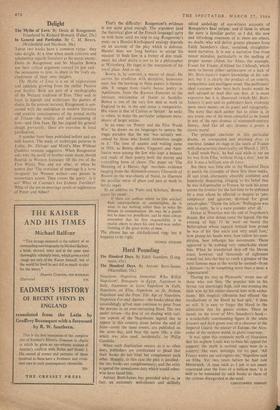Hard Pounding
The Hundred Days. By Antony Brett-James. (Macmillan,-35s.) Napoleon, Napoleon Immortal, Who Killed Napoleon?, Bonaparte in Egypt, Napoleon in Italy, Napoleon in Love, Napoleon in Exile, Napoleon on Elba. Napoleon on St. Helena, Napoleon and the Pope, The Age of Napoleon, Napoleon For and Against—the books about this astonishingly gifted man continue to pour from the presses in an ever-increasing flood. The two under review—the first of six dealing with vari- ous aspects of the Napoleonic legend due to appear in this country alone before the end of . June—cover the same events, arc published on the same day, and bear the same title, a title which was also used, incidentally, by Philip Guedella.
When such duplication occurs, as it so often does, publishers are constrained to plead that their books do not rival but complement each other. Happily, in this case the plea is justified: the two books are complementary; and the critic is spared the unwelcome duty which would other- wise have faced him.
Antony Brett-James has provided what is, in fact, an extremely well-chosen and skilfully edited anthology of eye-witness accounts of Bonaparte's final eclipse; and if those to whom the story is familiar prefer, as I did, this new and refreshing treatment of it, there are others, no doubt, who will derive greater pleasure from Edith Saunders's clear, sustained, straightfor- ward narrative. It is not a narrative free from minor mistakes, particularly in the spelling of proper names (Alton for Alten, for example, Fraser for Frazer, d'Alleud for l'Alleud), which seem to betray either carelessness or a lack of Mr. Brett-James's expert knowledge of his sub- ject; but it is clearly the product of an orderly, sympathetic and intelligent mind. The publishers' • ideal customer who buys both books would be well advised to read this one first. It is more expensive but it is illustrated (which Mr. Brett- James's is not) and its publishers have evidently spent more money on its paper and typography. The story that each author has to relate is. in any event, one of the most colourful to be found in any of the epic dramas of nineteenth-century history. And like all epic dramas it points a classic moral.
The principal character in this particular
drama, an unexpected and alarming dens ex machina, landed on stage in the south of France with characteristic theatricality on March I, 1815. 'I shall reach Paris,' he had said while at sea on his way from Elba, 'without firing a shot.' And he did. It was a brilliant tour de force.
But there was little else in the Hundred Days to match the triumphs of those first three weeks. Ill and tired, alternately absurdly confident and hopelessly despairing, clinging to his belief that he was indispensable to France, he took his army across the frontier for the last time to be defeated by a man whom he affected to despise as 'pre- sumptuous and ignorant, destined for great catastrophes.' Damn the fellow,' Wellington was able to reply, 'he is a mere pounder after all.'
Defeat at Waterloo was the end of Napoleon's dream. But after defeat came the legend. On the evening of July 15 he went on board the Bellerophon whose captain noticed how proud he was of his 'fine ancle and very small foot,' how plump his hands were, how sallow his com- plexiou, how lethargic his movements. There appeared to be nothing very remarkable about him. When he transferred ship off the Devon coast, however, and thousands of sightseers rowed out into the bay to catch a glimpse of the most famous man in the world he seemed—from a distance—to be something more than a man, a 'supernatural.'
'During his stay at Plymouth,' wrote one of
those who saw him, 'the popular tide in his favour ran alarmingly high, and one evening the mob won by his smiles cheered him with enthu- siasm.' His magical silhouette had effaced 'the recollections of the blood he had spilt.' It does so still. It ,is easy to forget the blood in the admiration that his genius evokes. There he stands on the cover of Mrs. Saunders's book— a wonderfully commanding figure in the white trousers and dark green coat of a chasseur of the Imperial Guard, the master of Europe, the Alex- ander of the modern world, la gloire incarnate. •
It was upon this romantic myth of Napoleon
that his nephew Louis was to base his appeal for support; the myth is revived again now in a country, like ours, nostalgic for its past. 'All France wants me and regrets me,' Napoleon said on ,Elba. Yet two_ years before he had told Metternich, 'A man such as I am is not much concerned over the lives of a million men.' It is well to be reminded by such books as these of the corpses disregarded in the mud.
CHRISTOPHER HILIBERT


































 Previous page
Previous page